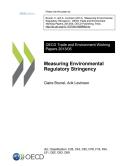
Researchers have long been interested in whether environmental regulations discourage investment, reduce labour demand, or alter patterns of international trade. But estimating those consequences of regulations requires devising a means of measuring their stringency empirically. While creating such a measure is often portrayed as a data-collection problem, this paper identifies four fundamental conceptual obstacles, which the authors label multidimensionality, simultaneity, industrial composition, and capital vintage. The paper then describes the long history of attempts to measure environmental regulatory stringency, and assess their relative success in light of those obstacles. Finally, the authors propose a new measure of stringency that would be based on emissions data and could be constructed separately for different pollutants.
This toolkit focuses on inclusive green growth—growth that not only helps green economies, but also helps move towards sustainable development by ensuring environmental sustainability contributes to, or at least does not come at the expense of, social progress. While there is good reason to think that improved environmental performance will benefit the poorest and most vulnerable, green growth policies must be carefully designed to maximise benefits and minimise costs for them, particularly during the transition. There is thus a critical need for policy design that also ensures that skills are upgraded and that jobs are decent, that vulnerable groups are not marginalised or left behind, and that revenues from fiscal reforms are also channeled into broader social protection and health measures.
A number of the tools that will be mobilised to implement inclusive green growth policies are "classic" public management tools, but this document focuses only on the most relevant instruments vis-à-vis green growth in developing countries, as these instruments are widely known and implemented the world over. What this toolkit aims for instead is to provide policy-makers with:
This paper discusses interactions that can occur when a cap-and-trade based emission trading system is combined with overlapping policy instruments (environmentally related taxes, subsidies, ‘command-and-control regulations, information instruments, etc.), addressing emissions stemming from the same sources.
This report confirms that the country is a global leader in renewable energy technology investment. In 2012, alone, China’s renewable energy investment totalled US$ 67.7 billion – the highest in the world – and double the amount it invested in 2009. However, the report underlines that despite China’s rapid advancement towards a green economy, the country is facing significant environmental and social challenges that must be addressed if it is to achieve its sustainable development goals.
